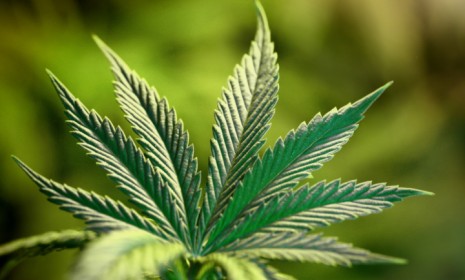How marijuana could help cure obesity-related diseases
A British company says that two compounds found in marijuana leaves could treat patients whose weight puts them at high risk for heart disease and stroke

A free daily email with the biggest news stories of the day – and the best features from TheWeek.com
You are now subscribed
Your newsletter sign-up was successful
According to a new British study, marijuana leaves (not the buds that Willie Nelson loves so dearly) contain two compounds that boost the metabolism of mice, leading to lower levels of fat and cholesterol in the body — the latest addition to a growing body of evidence that marijuana may be useful in countering ailments related to obesity. One study in March found that a brain chemical similar in structure to an active compound in cannibis could help people shed weight, while another study last September concluded that pot smokers were less likely to be obese than non-potheads, though for reasons that remain unclear. The researchers at Britain's GW Pharmaceuticals who are responsible for the latest weed development are already testing the two compounds on humans. Here, a guide to their findings:
So the company is allowed to grow and dispense marijuana?
Yes. Although marijuana is illegal in England, says Doug Barry at Jezebel, GW Pharmaceuticals, an "enormous multinational drug corporation equipped with all the magic passwords for dodging government regulations," was granted a license to grow the plant in specially constructed greenhouses at a secret location in the south of England.
The Week
Escape your echo chamber. Get the facts behind the news, plus analysis from multiple perspectives.

Sign up for The Week's Free Newsletters
From our morning news briefing to a weekly Good News Newsletter, get the best of The Week delivered directly to your inbox.
From our morning news briefing to a weekly Good News Newsletter, get the best of The Week delivered directly to your inbox.
What exactly did researchers learn from tests on mice?
The two compounds, THCV and cannabidiol, boosted the rodents' metabolisms — reducing fat levels in their livers and cholesterol levels in their bloodstreams — and also made the mice more sensitive to insulin and protected the cells that produce insulin, "allowing [the cells] to work better and for longer." The combined effects improved the mice's ability to burn off energy.
And the compounds didn't make mice hungry the way smoking weed affects humans?
Actually, the compounds were found to have an appetite-suppressing effect, but the effect only lasted for a short time.
A free daily email with the biggest news stories of the day – and the best features from TheWeek.com
When might this marijuana drug be available?
Results from a second round of clinical trials are expected later this year, but it could be a while before a resulting drug hits the market. Still, GW Pharmaceuticals has a decent track record: They already produce a cannabinoid that treats cancer pain and the symptoms of multiple sclerosis. As clinical trials continue, researchers hope to learn how to treat patients suffering from "metabolic syndrome," in which ailments like diabetes, high blood pressure, and obesity combine to increase the risk of heart disease and stroke.
Sources: EmaxHealth, Jezebel, Telegraph, UPI
-
 Political cartoons for February 19
Political cartoons for February 19Cartoons Thursday’s political cartoons include a suspicious package, a piece of the cake, and more
-
 The Gallivant: style and charm steps from Camber Sands
The Gallivant: style and charm steps from Camber SandsThe Week Recommends Nestled behind the dunes, this luxury hotel is a great place to hunker down and get cosy
-
 The President’s Cake: ‘sweet tragedy’ about a little girl on a baking mission in Iraq
The President’s Cake: ‘sweet tragedy’ about a little girl on a baking mission in IraqThe Week Recommends Charming debut from Hasan Hadi is filled with ‘vivid characters’